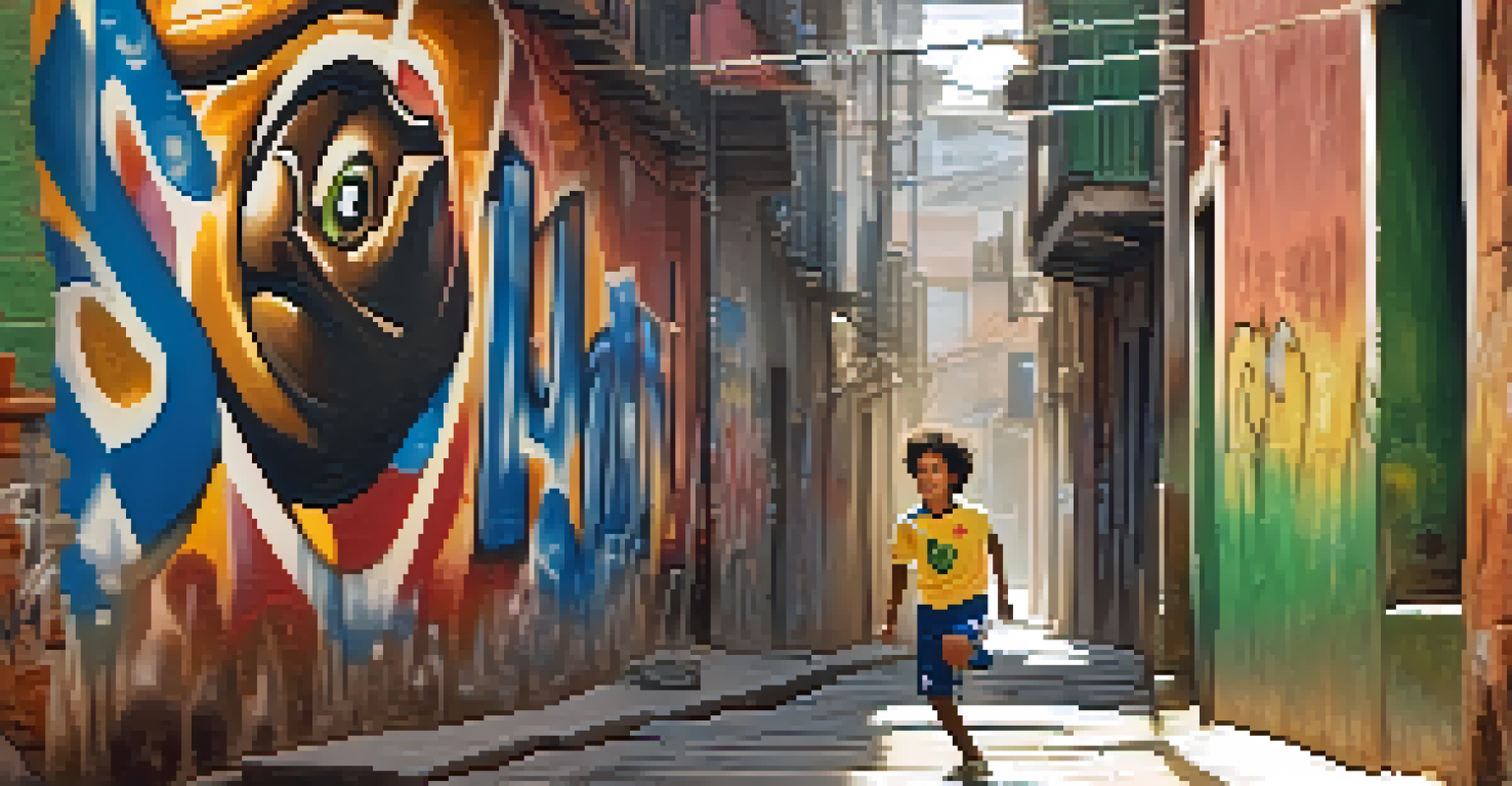The Role of Football in Brazilian Culture and Tourism

Football: The Heartbeat of Brazilian Culture
In Brazil, football isn't just a sport; it's a way of life. From the streets of Rio de Janeiro to the beaches of Salvador, you can find people playing football with passion and joy. This widespread love for the game fosters a sense of community and belonging, uniting individuals across social and economic backgrounds.
Football is a game of mistakes. Whoever makes the fewest mistakes wins.
The sport's deep roots in Brazilian culture can be traced back to the early 20th century when it became a symbol of national pride. Icons like Pelé and Zico have transformed football into an art form, inspiring generations of players and fans alike. Their contributions highlight the cultural significance of football, making it an integral part of Brazil's identity.
Moreover, football has influenced various aspects of Brazilian life, from music and dance to art and fashion. Samba rhythms often echo through stadiums, and football-themed art can be seen in galleries nationwide. This cultural fusion demonstrates how football transcends mere entertainment, becoming a vibrant expression of Brazilian heritage.
Major Tournaments and Their Cultural Significance
Brazil hosts some of the world's most prestigious football tournaments, including the FIFA World Cup and Copa America. These events not only showcase the nation's sporting excellence but also serve as a platform for cultural exchange. Fans from around the globe flock to Brazil, eager to experience the local culture while cheering for their teams.

During these tournaments, cities come alive with festivities, parades, and celebrations. The streets buzz with energy as fans paint their faces in vibrant colors and sing anthems that resonate with national pride. This collective experience fosters a sense of unity, showcasing Brazil's cultural richness on a global stage.
Football: A Cultural Cornerstone
In Brazil, football transcends mere sport, embodying the nation's identity and fostering community across diverse backgrounds.
Additionally, the success of the Brazilian national team has solidified the country's reputation as a football powerhouse. Winning five World Cups has made Brazil a symbol of excellence in the sport, attracting tourists who wish to witness this legacy firsthand. The thrill of attending a match in Brazil is an unforgettable experience, deeply intertwined with the nation's cultural fabric.
Local Clubs and Their Community Impact
Brazilian football clubs, such as Flamengo and São Paulo FC, play a crucial role in local communities. These clubs are not just sports teams; they are institutions that bring people together, fostering local pride and camaraderie. Matchday rituals often see fans gathering in neighborhoods, reinforcing community bonds and a shared identity.
The ball is round, the game lasts ninety minutes, and everything else is just theory.
The loyalty and passion of fans are immense, often passed down through generations. Children grow up idolizing their club's stars and participating in community events organized by the teams. This connection creates a vibrant atmosphere that extends beyond the pitch, influencing social dynamics in the surrounding areas.
Furthermore, local clubs often engage in social initiatives, using their influence to address community issues such as education and health. By investing in grassroots programs, they contribute to the well-being of their supporters, proving that football's impact goes far beyond entertainment. This commitment strengthens the relationship between clubs and their communities.
Football and Brazilian Identity
Football plays a significant role in shaping Brazilian identity, often reflecting the country's diverse culture. The sport is a melting pot of influences, integrating various styles and traditions from different regions. This diversity is evident in the playing styles, fan rituals, and even the music that accompanies matches.
The Brazilian philosophy of 'jogo bonito,' or 'the beautiful game,' emphasizes creativity and flair, showcasing the country's artistic spirit. Players are encouraged to express themselves on the field, embodying a sense of freedom that resonates with the broader Brazilian identity. This unique approach has earned Brazil a reputation for producing some of the world's most talented footballers.
Economic Boost from Football Tourism
Football tourism significantly contributes to Brazil's economy, attracting millions and creating jobs in various sectors.
Moreover, football serves as a source of national pride, especially during international competitions. The success of the national team instills a sense of unity among Brazilians, regardless of their background. In this way, football becomes a powerful symbol of what it means to be Brazilian, fostering a deep connection to the nation's heritage.
The Economic Impact of Football Tourism
Football tourism has become a significant economic driver for Brazil, attracting millions of visitors each year. Tourists flock to stadiums and local clubs, eager to immerse themselves in the vibrant football culture. This influx of visitors boosts local economies, creating jobs in hospitality, transportation, and retail sectors.
Major events like the World Cup generate substantial revenue, with fans spending on tickets, merchandise, and accommodations. Cities that host matches experience a surge in tourism-related activities, from guided stadium tours to themed experiences that celebrate Brazil's football legacy. This economic impact highlights the importance of football as a catalyst for growth.
Additionally, the rise of football-themed tours and experiences offers visitors an authentic taste of Brazilian culture. From attending local matches to participating in street football games, tourists can engage with the sport on a personal level. This connection not only enhances their travel experience but also fosters a deeper appreciation for Brazil's rich football heritage.
Challenges Facing Football in Brazil
Despite its immense popularity, Brazilian football faces several challenges that threaten its growth and sustainability. Issues such as corruption, mismanagement, and financial instability plague many clubs, undermining the sport's integrity. These factors can deter fans and tourists alike, impacting the overall perception of Brazilian football.
Furthermore, the increasing commercialization of the sport has raised concerns about its accessibility. Ticket prices for high-profile matches can be prohibitively expensive for local fans, limiting their ability to enjoy the game. This divide can alienate sections of the community, creating a disconnect between clubs and their loyal supporters.
Challenges Threatening Football's Future
Despite its popularity, Brazilian football faces challenges like corruption and social inequalities that jeopardize its growth and accessibility.
Lastly, Brazil's ongoing struggle with social inequalities affects the development of grassroots football programs. Many talented young players come from disadvantaged backgrounds, facing obstacles that hinder their potential. Addressing these challenges is crucial for nurturing the next generation of talent and ensuring the continued success of Brazilian football.
The Future of Football in Brazil
As Brazil looks to the future, there are several opportunities for growth within its football landscape. Embracing technology, such as data analytics and virtual reality, can enhance training methods and fan engagement. By leveraging innovation, Brazilian football can continue to evolve while retaining its unique cultural identity.
Furthermore, investing in youth development programs is vital for cultivating the next wave of talent. By providing resources and support to aspiring players from diverse backgrounds, Brazil can ensure a bright future for the sport. This commitment to grassroots development will ultimately strengthen the national team's performance on the world stage.

Lastly, fostering a culture of transparency and accountability within football organizations will help restore trust among fans and stakeholders. By addressing past issues and promoting ethical practices, Brazilian football can pave the way for a more sustainable and inclusive future. The potential for growth is immense, and the love for the game remains unwavering.